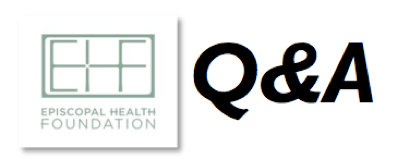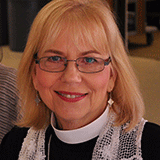
 Pat Ritchie is the deacon of St. Stephen’s Episcopal Church in Beaumont. She’s a Beaumont native and had a 26-year career in the financial software industry before leaving the corporate world to work at her church. After years of discernment and study at the Iona School for Ministry, Ritchie was ordained Deacon in February of 2009.
Pat Ritchie is the deacon of St. Stephen’s Episcopal Church in Beaumont. She’s a Beaumont native and had a 26-year career in the financial software industry before leaving the corporate world to work at her church. After years of discernment and study at the Iona School for Ministry, Ritchie was ordained Deacon in February of 2009.
Ritchie recently called and facilitated a convening of community leaders in health and social services in Beaumont. The goal of the meeting was to discuss the vision and direction for community health across the city and encourage collaboration between different groups.
EHF asked Ritchie a few questions about what spurred her to begin the effort:
What led you to call the Beaumont Convening?
I had been learning about community organizing and was teaching my Common Mission Team. We are seeking to find our special niche in the community. We had done a walkabout and a couple of events to get to know our neighborhood. EHF Congregational Engagement Officer Lisa Madry offered to come and talk to our team; about the same time Troy Bush-DiDonato, EHF’s Community Engagement Officer, came and interviewed me for his research. Then I was invited to a meeting where he handed out the research summary. All this was great timing, because my church is seeking to discern unmet community needs and that place where the needs and our passions and talents meet.
Then, I was invited to EHF’s December Community Meeting – it was held at my church. Listening to the proceedings, I began to realize that I knew nothing. And I could see that this would be a long process to do the work well. But as the meeting wrapped up, I noticed that no one other than the EHF team seemed to be rising to leadership. I thought the least I could do was offer to convene another meeting, so that all this work EHF has done was not dropped. I thought, “Anybody can host a meeting!”
How did it feel to facilitate the meeting?
Facilitating was a challenge because I had no goal really other than to get the group to work together to collect their many thoughts and viewpoints to start honing in on a positive change for Beaumont. I knew very few of the people and mostly was not familiar with the work their organizations did.
I still feel challenged. If these were my church people, I would be totally confident, but I just don’t really know these people’s worlds. That said, I am willing to be brave if it will allow my community to benefit from the expertise that EHF has to offer us and perhaps to do something transformative for the health of our town.
What have you learned from facilitating the Beaumont convening? What have you learned of the nature of collaboration?
A lot of people care. A lot! There are people willing to give their precious time and their energy for the good of the community. It is an exciting time for us. I have learned that in collaboration we all have to drop our own agendas and really listen to one another. What is good for the community may be revealed in a way that we would least expect.
Do you have a philosophy that guides or motivates you, especially when it comes to your responsibilities to your community?
I am motivated by the Gospel of Jesus Christ. He said Love your Neighbor and Tend My Sheep. As disciples of Jesus Christ, we are to care for one another, even those we don’t agree with or distrust. He is the light of the world and he commissioned us to take that light into the dark corners. And every tiny little step is important: every handshake, every smile, every relationship built.
What other community initiatives are you involved in?
As a deacon it is my work to bring the needs of the world into the church so that we always stay aware of those needs and consider how we can love our neighbor and help them. And vice versa—I take the church into the world. I model servant leadership by planning a variety of activities that get the folks from my church out face to face with our neighbors who are marginalized because of poverty, illness, injustice, loneliness, imprisonment, oppression—whatever.
I have some other responsibilities with the Diocese. I am Chair of the Committee for the Diaconate—which leads in the discernment, formation and support of new deacons. I also serve on the Commission for Ministry.
I am a part of the Emergency Spiritual Care Team that is deployed to provide pastoral care to victims of disasters. Currently we are working in Deweyville, a small community that was recently flooded, providing support for community leaders, children and residents of the community.
What advice would you give to someone who might be on the fence of taking the initiative to improve their community’s health or address another community need?
If not you, then who? Transformation will never occur if some of us aren’t willing to be responsible. We have an incredible resource in the Diocese of Texas with the Episcopal Health Foundation offering us their expertise. It is a gift, we should use it wisely.